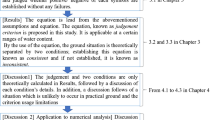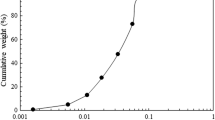Abstract
Unsaturated seepage exists in most geotechnical engineering. However, the research results of unsaturated seepage monitoring are relatively few. In order to study the difference of seepage monitoring results between saturated and unsaturated state, based on the point heat source method of seepage monitoring, the calibration tests of seepage velocity for two kinds of gravel soils with different gradations under saturated and unsaturated state were carried out respectively. The comparison results show that the calibration results between the two states are different. Especially for the cases with low seepage velocity, the absolute value of the seepage discrimination index obtained under the unsaturated state is greater than that under the saturated state. Therefore, the monitoring results are conservative when the seepage velocity is small and the calibration relationship under the saturated state is used to invert the seepage velocity under the unsaturated state.
Similar content being viewed by others
References
Battaglia D, Birindelli F, Rinaldi M, Vettraino E, Bezzi A (2016) Fluorescent tracer tests for detection of dam leakages: The case of the Bumbuna dam — Sierra Leone. Engineering Geology 205:30–39, DOI: https://doi.org/10.1016/j.enggeo.2016.02.010
Chen J, Cheng F, Xiong F, Ge Q, Zhang SJ (2017) An experimental study: Fiber Bragg grating-hydrothermal cycling integration system for seepage monitoring of rockfill dams. Structural Health Monitoring 16(1):50–61, DOI: https://doi.org/10.1177/1475921716661874
Chen J, Fang X, Cheng F, Ge Q, Xiong F (2020) Sensitivity analysis and seepage/leakage monitoring using point heat source. Geotechnique, DOI: https://doi.org/10.1680/jgeot.19.p.245
Chen J, Xiong F, Zheng JL, Ge Q, Cheng F (2019a) Calibration experiment for seepage monitoring using fiber Bragg grating hydrothermal cycling integration system. Geotechnical Testing Journal 42(4):914–929, DOI: https://doi.org/10.1520/GTJ20170179
Chen J, Xiong F, Zheng JL, Ge Q, Cheng F (2019b) The influence of infiltration angle on the identification effect of seepage with linear heat source method. Measurement 148:106974, DOI: https://doi.org/10.1016/j.measurement.2019.106974
Chen J, Zheng JL, Xiong F, Ge Q, Yan QX, Cheng F (2018) Experimental investigation of leak detection using mobile distributed monitoring system. Smart Materials and Structures 27(1):015025, DOI: https://doi.org/10.1088/1361-665X/aa9c78
Cheng X, Li QQ, Zhou ZW, Luo ZX, Liu M, Liu L (2018) Research on a seepage monitoring model of a high core rockfill dam based on machine learning. Sensors-Basel 18(9):2749, DOI: https://doi.org/10.3390/s18092749
Coté A, Carrier B, Leduc J, Noäl P, Beauchemin R, Soares M, Garneau C, Gervais R (2007) Water leakage detection using optical fiber at the Peribonka dam. Proceedings of the 7th international symposium on field measurements in geomechanics, September 24–27, Boston, MA, USA
Fan ZC, Chen JS, Li SX (2006) Application of environmental isotope and fuzzy clustering method to study leakage from embankment. Advances in Water Science 17(1):37–42, DOI: https://doi.org/10.3321/j.issn:1001-6791.2006.01.006
Fang X, Xiong F, Chen J (2019) An experimental study on fiber Bragg grating-point heat source integration system for seepage monitoring. IEEE Sensors Journal 19(24):12346–12352, DOI: https://doi.org/10.1109/JSEN.2019.2937155
Khan AA, Vrabie V, Beck YL, Mars JI, D’Urso G (2014) Monitoring and early detection of internal erosion: Distributed sensing and processing. Structural Health Monitoring 13(5):562–576, DOI: https://doi.org/10.1177/1475921714532994
Li LP, Tu WF, Zhou ZQ, Shi SS, Zhang MG, Chen YX (2020) Dynamic unloading instability mechanism of underground cavern based on seepage-damage coupling. KSCE Journal of Civil Engineering 24(5):1620–1631, DOI: https://doi.org/10.1007/s12205-020-1288-3
Rozycki A, Fonticiella JMR, Cuadra A (2006) Detection and evaluation of horizontal fractures in earth dams using the self-potential method. Engineering Geology 82(3):145–153, DOI: https://doi.org/10.1016/j.enggeo.2005.09.013
Sjödahl P, Dahlin T, Johansson S (2010) Using the resistivity method for leakage detection in a blind test at the Røssvatn embankment dam test facility in Norway. Bulletin of Engineering Geology and Environment 69(4):643–658, DOI: https://doi.org/10.1007/s10064-010-0314-y
Su HZ, Cui SS, Wen ZP, Xie W (2019) Experimental study on distributed optical fiber heated-based seepage behavior identification in hydraulic engineering. Heat and Mass Transfer 55:421–432, DOI: https://doi.org/10.1007/s00231-018-2431-2
Su HZ, Hu J, Yang M (2015) Dam seepage monitoring based on distributed optical fiber temperature system. IEEE Sensors Journal 15(1):9–13, DOI: https://doi.org/10.1109/JSEN.2014.2335197
Su HZ, Li H, Kang YY, Wen ZP (2018) Experimental study on distributed optical fiber-based approach monitoring saturation line in levee engineering. Optic and Laser Technology 99:19–29, DOI: https://doi.org/10.1016/j.optlastec.2017.06.032
Su HZ, Tian SG, Kang YY, Xie W, Chen J (2017) Monitoring water seepage velocity in dikes using distributed optical fiber temperature sensors. Automation in Construction 76:71–84, DOI: https://doi.org/10.1016/j.autcon.2017.01.013
Vogt T, Schneider P, Hahn-Woernle L, Cirpka OA (2010) Estimation of seepage rates in a losing stream by means of fiber-optic high-resolution vertical temperature profiling. Journal of Hydrology 380: 154–164, DOI: https://doi.org/10.1016/j.jhydrol.2009.10.033
Wang CH, Chen JH, Wang J, Chen JP (2016) Flume testing of seepage velocity monitoring using optic fiber distributed temperature sensing for embankments. Sensor Review 36(2):120–129, DOI: https://doi.org/10.1108/SR-04-2015-0065
Yan JF, Shi B, Zhu HH, Wang BJ, Wei GQ, Cao DF (2015) A quantitative monitoring technology for seepage in slopes using DTS. Engineering Geology 186:100–104, DOI: https://doi.org/10.1016/j.enggeo.2015.01.001
Zhao XM, Gao YF, Wang QW, Gao JQ, Zhou Y, Wu G, Yao J (2018) Test research of seepage monitoring based on distributed optical fiber. Transactions of Nanjing University of Aeronautics and Astronautics 35(2):300–308, DOI: https://doi.org/10.16356/j.1005-1120.2018.02.300
Zhu PY, Leng YB, Zhou Y, Jiang GL (2010) Safety inspection strategy for earth embankment dams using fully distributed sensing. Proceedings of 2nd international science, social science, engineering and energy conference, December 15–16, Nakhon Phanom, Thailand
Acknowledgments
This work was supported by the National Natural Science Foundation of China (51509174).
Author information
Authors and Affiliations
Corresponding author
Rights and permissions
About this article
Cite this article
He, F., Chen, J. & Xiong, F. Comparison of the Seepage Monitoring Results between Saturated and Unsaturated State Using Point Heat Source Method. KSCE J Civ Eng 25, 4567–4574 (2021). https://doi.org/10.1007/s12205-021-1635-z
Received:
Revised:
Accepted:
Published:
Issue Date:
DOI: https://doi.org/10.1007/s12205-021-1635-z




